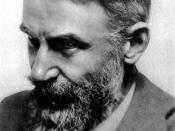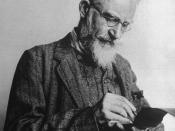The "Pygmalion Effect" is known by psychologists as "The Self-fulfilling Prophecy". This essay shall attempt to show the mechanisms by which the Pygmalion Effect operates and provide evidence of its effect in relevant case studies and social situations.
The Pygmalion Effect, popularised by George Bernard Shaw's novel "Pygmalion" can be recognised in all walks of life. Simply it describes a circle of events that may occur when a person has clear and positive expectations for influencing the performance of another person or a group of people. It follows a standard pattern to achieve its aim: We conceive certain ideas and expectations of a person or a particular event. Next, through various prompts and cues, we communicate these expectations. Automatically the person targeted with these expectations begins adjusting his/her behaviour patterns to match these preconceived ideas. Finally, it goes full circle with the original expectation becoming a reality.
Thus it is a recognised behavioural pattern that one person's positive expectations can be a powerful tool to influence the preformance of another.
Numerous classroom psychological studies have been carried out that outline how teachers communicate expectations. General experiments have shown that where teachers have seated "high expectation" students close to the front of the class, maintaining lots of verbal interaction and eye contact and offering lots of praise to successful responses, those students in question here excelled and bettered their academic position. In direct contrast, students categorised as "low expectations" subjects responded according when they were deliberately seated at the back of the class, not given sufficient time to respond to questions, given very little encouragement and initially no feedback.
In a classic experiment by Mark Snyder and William B. Swann (1978) the participants were led to believe that the person they were about to interview was either introverted or...


